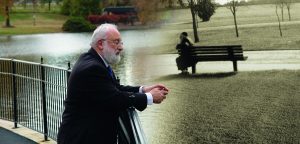
One cold, rainy evening in February 1979, as I was doing my usual delving into Kabbalah books with my friend Chaim Malka, I realized that it was hopeless. “Chaim,” I said, “we are going to find a teacher right now.” We got into the car and drove off to Bnei Brak, an Orthodox city where I had heard that people study Kabbalah. As the rain poured down the windshield; I drove almost blindly, in zero visibility. But I was driven from within; I had to keep going.
Once inside the city, we had no idea where to go. Suddenly, I saw a man standing on the sidewalk waiting to cross the street. In the pouring rain, he was the only one around. I rolled down the window and hollered through the torrent: “Where do they study Kabbalah around here?!”
The man looked at me nonchalantly and said, “Turn left and drive toward the orchard. At the end of the street you’ll see a house across from it; that’s where they study Kabbalah.”
In that house by the orchard, I met my teacher, Rav Baruch Shalom HaLevi Ashlag (RABASH), the firstborn son and successor of Rav Yehuda Leib HaLevi Ashlag, the greatest kabbalist of the 20th century, who was known as Baal HaSulam (author of the Sulam) after his Sulam (Ladder) commentary on The Book of Zohar.
During the next twelve years, I served as RABASH’s personal assistant and became his prime disciple. I studied with him three hours in the morning and two hours in the evening with everyone else. I also studied with him while we were alone as I took him on his daily outings to the beach or to the park. I studied with him every other weekend when the two of us spent weekends in each other’s company, and I studied with him when he was hospitalized for a month on two occasions. I asked him all the questions that I could about spirituality, whether during lessons or while driving, or at any other opportunity. I asked him because I needed to know. I knew he was the last of the Mohicans, the final link in a lineage that goes back millennia, and I knew I would have to keep that teaching going. I recorded every lesson and took notes of his words. I absorbed from him everything I could, the outer and the inner meaning of the words, so I could pass them on when the time came.
After some years, when RABASH told me that I needed friends with whom to practice spiritual work, I brought him forty students. To them he started writing his priceless essays about one’s progress from a regular person to a kabbalist—who knows the innermost subtleties of human nature and one’s relationship with the Creator.
The essays of RABASH paved the way not only for his students, but for all of us, every single person. Now these essays are a lighthouse that shows the way to anyone who wants to achieve spirituality. They teach us how to relate to one another and how to relate to the feelings and states we discover within us along the way. RABASH, much like his father in his own way, was a pioneer, a trailblazer of endless courage, compassion, and love for humanity.
After his demise in 1991, people asked me to start teaching. RABASH had encouraged me to teach while I was still with him, so when people approached me I consented and formed a study group we called Bnei Baruch (sons of Baruch). Indeed, we aspired then and aspire now to merit the name and be my teacher’s spiritual children.
Today, as we commemorate the 29th anniversary of his passing, it is my hope that we will continue to merit the name Bnei Baruch, to walk in his path of love and unity, and to spread the authentic wisdom of Kabbalah throughout the world to every thirsty soul.
“And once I have acquired a clothing of love, sparks of love begin to shine within me, the heart begins to long to unite with my friends, and it seems to me that my eyes see my friends, my ears hear their voices, my mouth speaks to them, the hands embrace, and the feet dance in a circle, in love and joy together with them. And I transcend my corporeal boundaries and forget the vast distance between my friends and I … and it seems to me that there is no reality in the world except my friends and I. After that, even the ‘I’ is cancelled and immersed, mingled in my friends, until I stand and declare that there is no reality in the world but the friends” (RABASH, Letter No. 8).